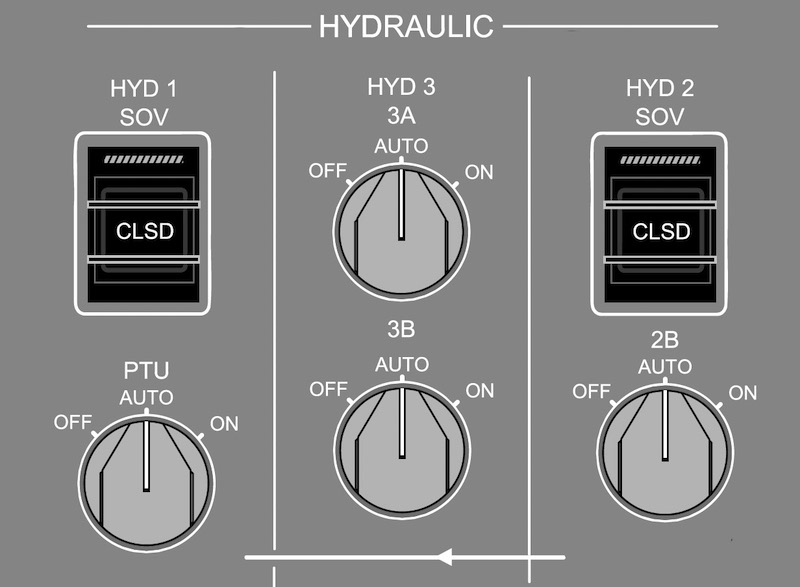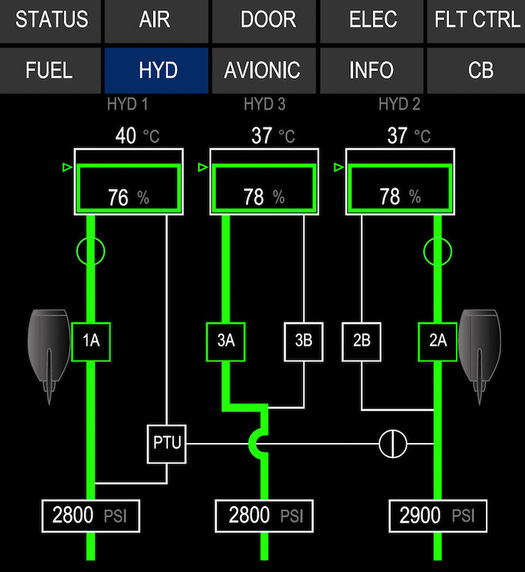Airbus A220 - Hydraulics
The hydraulic power is supplied by three independent systems. Each system delivers a nominal pressure of _____
Both system No. 1 and No. 2 have a fuel/hydraulic heat exchanger that uses fuel to cool the hydraulic fluid. The heat exchangers are:
The system No. 3 hydraulic fluid is cooled:
In the hydraulic system No. 1, the purpose of the Priority Valve (PV) is to:
In this case, the landing gear can still be deployed with the ALTN GEAR switch on the landing gear panel.
The RAT will deploy and supply backup hydraulic pressure to system No.3 automatically if there is a total loss of DC and AC power in flight. It can also be manually deployed when the flight crew presses the RAT GEN guarded switch on the ELECTRICAL panel.
The RAT will deploy and supply backup hydraulic pressure to system No.3 automatically if there is a total loss of AC power in flight.
When the parking brake cycles OFF – ON – OFF, with the PTU and ACPM 2B rotary switch in the AUTO position, the PTU and the ACMP 2B will operate for _____.
The RAT pump is operational when the RAT is fully deployed (automatically or manually). During deployment, hydraulic system _____ deliver the hydraulic pressure.
When the RAT is deployed, the hydraulic pump operates at a nominal hydraulic pressure of _____ and supplies hydraulic pressure to the primary flight controls for all phases of flight.
The RAT pump is stowed in the RAT compartment between the main landing gear.
Hydraulic system No. 1 and No. 2 reservoirs assemblies do not need to be pressurized by the engine bleed air. The high-pressure fluid return acts on a piston to create a positive pressure in the low-pressure section of the reservoir.
This positive pressure pushes the hydraulic fluid to the Engine Driven Pumps (EDPs) through the Shutoff Valve (SOV) to prevent pumps from cavitation and to ensure supply during negative g situations.
Each hydraulic system uses a reservoir to store hydraulic fluid and to supply it to the components. The systems are equipped with a main pump and a backup pump to supply pressure. There is limited fluid exchange between hydraulic systems. Each system is protected to ensure a safe operation of the aircraft.
There is NO fluid exchange between hydraulic systems.
Advertisement
When the PTU selector is set to ON, the PTU operates and supplies pressure to:

The system No. 1 and system No. 2 hydraulic reservoirs are:
In the hydraulic system No. 2, the purpose of the Priority Valve (PV) is to:
Hydraulic system No. 1 and No. 2 have a similar operation. The differences between hydraulic system No. 1 and No. 2 are:

The system No. 1 reservoir has a slightly bigger capacity than the system No. 2 reservoir. The hydraulic system No. 3 reservoir has the same design as the reservoirs of system No. 1 and system No. 2 but it has the smallest capacity.
